- Home
- Pearl S. Buck
Kinfolk Page 2
Kinfolk Read online
Page 2
He contemplated his son from behind his spectacles. The lenses were so thick that they magnified his eyes slightly and added force to his gaze.
“It seems unwise to return home at this time,” he said. “The country is in great confusion. The Communists are threatening, and as my son your life can scarcely be safe. I would of course commend you to my friends in the government, but they could not guarantee your safety from rebellious students who might revenge themselves on me by killing you.”
“I do not want to be under the protection of anyone,” James said. “I shall just go.” He sat on the sill of the long double window, and gazing toward the river as he spoke, he could see the bridge glittering in the sunlight. It looked at once delicate and strong, a silver cobweb of steel against a misty blue sky.
“But where?” Dr. Liang asked sharply. “Where can you go in China today and not waste yourself?”
James did not answer. He sat motionless, and Dr. Liang saw more strongly than ever the son’s resemblance to his mother. Mrs. Liang was a good wife and an exemplary mother. She managed the household well, in spite of imperfect English which she would not improve, but she was stubborn.
“Your education has cost me a great deal of money,” Dr. Liang went on. “Fortunately my books on Chinese philosophy have sold well. But suppose they had not?”
James smiled. “I cannot imagine it, Father.”
Dr. Liang examined his son’s square but very handsome young face. Was this remark made with some jocular meaning? He did not understand American humor, which seemed to saturate his children. But the smile on his son’s lips was kindly.
“There is no hospital in China which is up to the standard to which you have been trained,” he observed.
“It has been twenty years since you lived there, Father.”
“You know very well that I was there ten years ago.”
“Only for six months, and you traveled constantly,” his son murmured.
“And in all my travels I saw nothing but the most primitive ways of life,” Dr. Liang retorted. “The civilization which was kept alive by the great old families such as ours is dying out. When I saw our ancestral halls I wept. My old uncle Tao lives there as a beggar—or very nearly.”
“I want to see for myself,” James said.
“How do you propose to make your living?” Dr. Liang asked almost harshly. His large beautifully shaped hands, as smooth as a woman’s, he kept habitually relaxed in order that there might be no tension in him. The cult of the hands, he often said, was a profound one. Now involuntarily he clenched his hands.
“You need not send me anything, Father,” James said.
“Of course I must! I won’t have my son going about like a beggar.”
“Do you mean I may go?”
“I do not,” Dr. Liang exclaimed. “On the contrary, I forbid it.”
James stood up. He turned from the window and faced his father. “Please don’t say that. I don’t want to have to go without your consent.”
The moment which both had dreaded for so many years had suddenly come—the moment of open rebellion. Dr. Liang had waked often in the night and dreaded it. He was proud of his elder son, and he told himself and his wife many times that James alone had justified his decision to live abroad. Had they stayed among the wars and confusions of modern China, the boy’s brilliant mind, his extraordinary talents, could never have been developed.
There were many other proofs of his wisdom. His children were all well educated; they had this comfortable and even luxurious home. They were healthy and full of energy and able to look after themselves. As for himself, Dr. Liang always said, he felt that Heaven had directed his steps, and that he had been useful in explaining to Americans the real China, the great civilization which today was obscured but which would assuredly shine forth again when peace was established in the world. It was no small mission to bring the East and West together. When times were better again he hoped, he told his American friends, to return to his own country to spend his old age, and there he would expound to his countrymen the glories of the American civilization.
“If you disobey me,” Dr. Liang now said, his hands still clenched on his knees, “then I will disown you.”
“I shall still be a Liang,” James said. “You begot me and you cannot deny that.”
Father and son glared at each other without a sign of yielding. “If I cannot deny it, I will forget it,” Dr. Liang said loudly.
Outside the door they heard footsteps retreating softly. Dr. Liang rose and strode across the room and threw open the door. No one was there. The spacious rooms were silent. He closed the door again. It was perhaps only the Irish maid Nellie who came every day to clean and to cook. But he had scarcely seated himself again when the door opened impetuously and Mrs. Liang stood there, this morning encased in a long gown of dull purple satin. In spite of her many years here she looked as Chinese as the day she had left her father’s house thirty years ago to marry a young student whom she had scarcely seen. Her hair was smoothed back into a neat bun, and her full rosy face was kind but strong-tempered.
“Now what is going on here?” she demanded in the loud voice which her husband detested. Long ago he had learned that the best way to reprove her was by making his own voice especially gentle.
“Our son asks me to allow him to return to our old home.” He spoke always in Chinese to his wife, as a reminder that he did not consider her English good enough. His own was pure, with an Oxford accent. He had visited Oxford once for a year’s lectures.
“Let him go then,” Mrs. Liang exclaimed. She came in and sat down on a large square stool, and her satin gown wrinkled over her breasts and her belly. Dr. Liang looked away.
“You do not understand, mother of my sons.” He always called her “mother of my sons” when he wanted to be very Confucian. “His life would not be safe. I have reproved our Communists so openly here that they will try to kill him if he goes to China.”
She sighed loudly at this and plucked from the knot of her hair a gold pin with which she scratched her inner ear. “I told you to stick to Confucius,” she complained. “Why should you talk about Communists? No one in America wants to hear about them.”
Dr. Liang closed his eyes at this stupidity and at the sight of the hairpin. At one end of it was the earpick and at the other a toothpick. He had besought her to throw this primitive implement away but she had refused. “How then would I pick my teeth and clean my ears?” she had demanded.
“American women do not use these instruments,” he had said.
She had stared at him. “How do you know?” she had asked shrewdly.
“Not in public, I mean,” he had said hastily.
They had compromised after ten years of argument upon her not using the pin publicly. That is, she did not use it before Americans. Chinese she did not consider the public. She used the earpick now, first on her right ear and then on her left, a busy look on her face. This helped her to think, she often declared.
“I cannot allow you to be killed, my son,” she now said to James. “If your father is sure there is danger, then you had better stay here for a year or two longer. That is a good job you are offered in the medical center. They think highly of you there.”
Dr. Liang was delighted. She invariably took the children’s part against him and he had braced himself for her stand against him now.
He rose. “You see, my son! You can scarcely disobey both parents. Your mother speaks wisely. This is very sensible of you, mother of my sons. Now, please, allow me to do my work. I am in the middle of a very important chapter on Confucius and Communism.”
“Do leave the Communists out of your book,” Mrs. Liang exclaimed. “Otherwise it can’t sell.”
“No, no,” he said humorously, “you don’t understand. It is all in joke.”
“But why joke about them?” she asked.
“Come, come, now, let me do my work.” He commanded and she retreated protesting. When he turned to
speak to his son again, he was gone. James had left the room by the door into the dining room.
Dr. Liang stood irresolute for a moment. Then he sighed, pulled out a large silk handkerchief from the pocket of his expensive dark broadcloth suit, wiped his face and hands, and sat down before his desk.
Outside his father’s deeply carpeted study James found his sister Mary. She was a small slight girl who could easily have looked not more than twelve years old except that her dress was that of a twenty-year-old young woman, which she was. Her hands were clenched tightly on her breast and her pretty face was anxious.
“You sent Mother in!” James whispered.
“But to quarrel with Father!” she whispered back. “It’s so hopeless.”
They tiptoed away hand in hand through the hall and opened the door and went into the lobby outside. James pushed the button for the elevator. “Father always forces a quarrel,” he said. “Will you be cold without your coat?”
“No—the sun is warm enough. Jim, why do you let yourself be forced?”
“I don’t know.” His voice was helpless and his face grim.
The elevator clattered, the gate banged open and they entered. They were silent before the elevator man, although they knew him well and were fond of him. Whatever their division behind their own doors, the Liang family presented a calm front before the people in whose land they were aliens.
“Nice day,” the elevator man offered.
“Fine,” they answered together.
They left the elevator decorously, side by side. James was tall and Mary came below his shoulder. The elevator man watched them affectionately. “Nice kids, even if they are Chinese!” he told the second elevator man. “You never see them comin’ in drunk and havin’ to be hauled up like some of the rest of ’em.”
The second elevator man scratched his head with his forefinger. “The old Chink is kinda stingy, I notice.”
“Don’t ask us no favors, though—no dogs to drag out in all kinds of weather.”
“Nice family,” the other agreed, and yawned.
Out in the sunshine James walked along the street with the long noiseless step that was his inheritance of grace. Mary took two steps to his one. The street was quiet, for it was far uptown. To their left now was the river, spanned by the George Washington Bridge. This bridge had deeply affected their lives. As children it had made them imagine bridges over oceans to China, and it had persuaded them to believe that it was always possible to cross stretches of hardship and unhappiness and set foot on other shores. It had made Peter, by the time he was ten, decide to be an engineer.
“Did Father say you could go?” Mary asked.
“No—and Mother only helped him—not me.”
“Oh, and she promised!” Mary cried.
“She said something about staying here for a year or two. You know what she means. She wants me to marry and have a son.”
“How can she be so old-fashioned?” Mary moaned. “She might as well have lived her whole life in our village!”
James shrugged his broad shoulders and lifted his hand to push back the lock of strong black hair that the river wind had blown over his forehead. “I’m not thinking only of my self,” he said. “I’m thinking of you, too, Mary. If I can’t go, they won’t let you.”
“I suppose you could ask Lili to marry you now,” Mary suggested. “That would be a compromise, wouldn’t it? Let’s sit down, Jim. The wind beats at me and blows the words out of my mouth.”
He turned to the benches that stood near the railing above the river and chose an empty one at some distance from the others. A curve in the embankment sheltered them, and the sun poured down upon them.
“You’ll think me a coward,” he said abruptly. “I’ve never told Lili that I want to go home.”
“I know you haven’t,” his sister said in her sweet voice. “But I’ve told her, Jim.”
“Mary!” His cry was mingled with reproof and relief. “Without asking me!”
She nodded her head. Putting up her little hand she brushed back the strands of her soft straight black hair which had escaped from the two thick braids wound about her head. “I had to make her see how much it meant to you.”
She was too delicately kind to say that Lili Li, to whom he had been secretly engaged for eight days, might not want to live in China.
“What did she say?” Fine tense lines sprang to life in his face. The calm of his outward manner was a habit, worn as separately as a coat which he took off or put on.
“She didn’t say anything—she just looked at me,” Mary replied. “You know the way she looks.”
“I know.”
They were silent for a while, gazing out over the river. Ships shone in the sunlight. A man-of-war glittered with flying flags. A yacht, bright with brass, steamed busily toward the harbor. Across the river an enormous sign announced a pleasure park.
James knew very well the way that Lili Li could look. Her great dark eyes were like oval gems of onyx set into the smoothness of her soft face. Her lips were full and rested sweetly together. She painted them, as all girls did, and they looked like a red camellia against the cream of her skin. Silence was her charm. Where other Chinese girls were chattering and restless, in imitation of American girls, Lili was quiet, and every movement was slow and all her slender body was rich with repose. The Li family had come from Shanghai only a year ago, Mr. Li for a gall-bladder operation by American doctors and Mrs. Li to see that Lili, the only child, was educated in American schools. They were wealthy and kindly, and they were frankly glad to be in a country where life was still comfortable. Mr. Li, a prudent man, had years ago sold his silk mills to the Japanese and had deposited his fortune in American banks.
James had fallen in love with Lili at first sight, but she was not easily won. At first she had been shocked at his impetuous proposal, made at the annual New Year’s party given by Dr. and Mrs. Liang. She was too sophisticated, as a Shanghai girl, to declare that he should first approach her parents. She compromised between new and old customs by dropping her head, touching her embroidered handkerchief to her lips, and saying that she did not want to marry anybody, not for a long time, because she wanted to finish her education. It took months of constant attendance upon her, buttressed by many courtesies from Dr. Liang to Mr. Li and much advice and practical aid from Mrs. Liang to Mrs. Li on the difficulties of finding a proper place to live and on the strange behavior of American servants, before Mr. and Mrs. Li would advise their daughter to yield even slightly to young Dr. Liang’s advances. Mr. Li had meanwhile learned, from sources which seemed naturally open to him in whatever country he was, that Dr. Liang, while not a rich man in the sense of big business, was nevertheless comfortably well off, that he had a high place in society as a scholar and a writer, and that the Li family would gain in prestige by the marriage. Moreover, Dr. James Liang was a brilliant young physician and he would undoubtedly be very rich some day, if he stayed in New York.
Meanwhile Mrs. Li had become anxious, as she grew familiar with American life on the streets of New York, lest Lili be attacked by American ruffians and robbed of her virtue, or, almost worse, lest some American fall in love with her and want to marry her. She was afraid that she and Mr. Li, who were both mild people, might not have the courage to refuse their daughter to an ardent and desperate American. Therefore they had made known their growing approval of the Liang family to Lili, and Lili had accepted James.
Nevertheless she did not wish to let her parents think her the usual old-fashioned obedient Chinese daughter, and so she had told Jim very shyly, after his proposal and her acceptance, that she did not want anybody to know at least for a whole week. To this he had agreed because it gave him time to persuade his father to let him go to China. With that permission he would tell Lili that they would make their home in Peking itself. The Liang ancestral lands and village were only about a hundred li south of the city. He was lucky, he told himself, that he would have as his wife a real Chinese girl ins
tead of an American-born Chinese who might be very unhappy even in her own country.
He moved restlessly on the bench beside his sister and then he got up. “When did you tell Lili?” he asked.
“Yesterday. She telephoned to ask me to go to Radio City with her. You know she doesn’t dare go alone anywhere.”
“That’s her mother,” James said.
“She’s afraid, too,” Mary said.
They had discussed Lili’s tearfulness before, Mary critically and James with defense. “Inevitably Lili was affected by the war, even in Shanghai,” he now said. Mary did not answer. She continued to gaze dreamily across the river at the flashing sign of the amusement park. She had seen that sign all her life but she had never been to the park. Peter and Louise went every summer and came back weary with laughter and half sick with spun sugar and popcorn, both of which she hated. But most of all she hated loud voices and catcalling, whistling young white men. She loathed the touch of their flesh. Her heart was full of dreams about the country she had never seen, yet to which she belonged, where her own people lived. She could believe nothing but good about China, nothing but what was brave about her people. When Madame Chiang had visited America she had been in her first year of high school, and without hope of meeting her. But she had seen her, flashing in and out of hospitals, in and out of great cars, in and out of hotels, and always proud and beautiful. She had made a scrap book of the newspaper photographs.
“I’m going to see Lili now,” James said suddenly.
Mary looked at her watch. It was still early. “Hadn’t you better telephone first?” she asked. “She may not be up. You know how Mrs. Li is—she plays mah-jongg all night, and Lili stays up—”

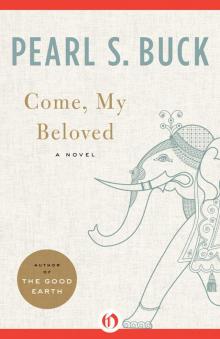 Come, My Beloved
Come, My Beloved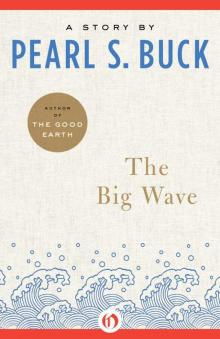 The Big Wave
The Big Wave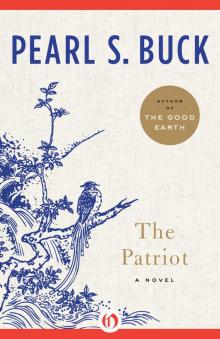 The Patriot
The Patriot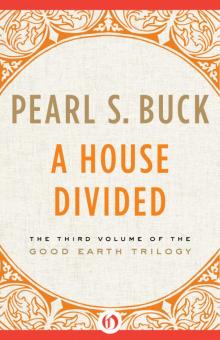 House Divided
House Divided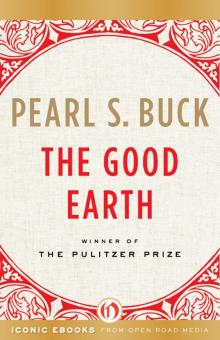 The Good Earth
The Good Earth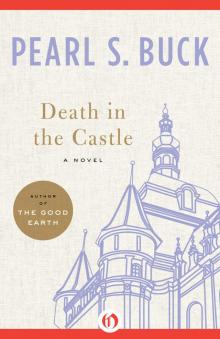 Death in the Castle
Death in the Castle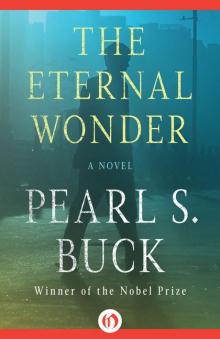 The Eternal Wonder
The Eternal Wonder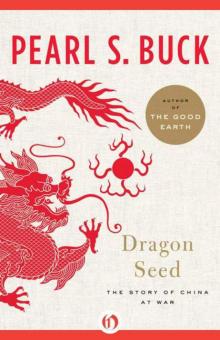 Dragon Seed: The Story of China at War
Dragon Seed: The Story of China at War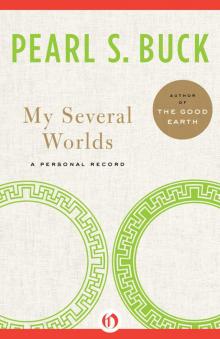 My Several Worlds: A Personal Record
My Several Worlds: A Personal Record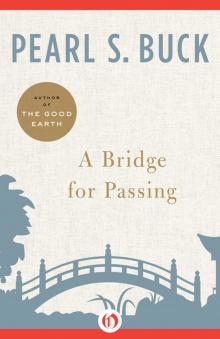 A Bridge for Passing: A Meditation on Love, Loss, and Faith
A Bridge for Passing: A Meditation on Love, Loss, and Faith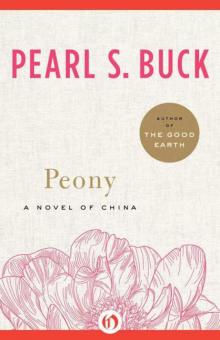 Peony
Peony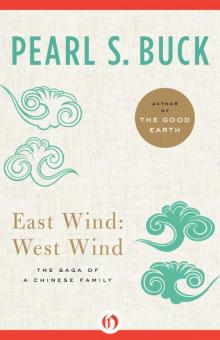 East Wind: West Wind: The Saga of a Chinese Family
East Wind: West Wind: The Saga of a Chinese Family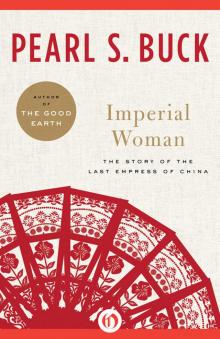 Imperial Woman
Imperial Woman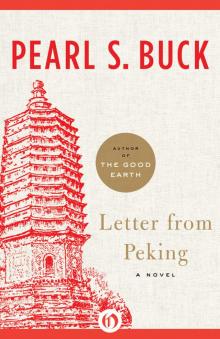 Letters From Peking
Letters From Peking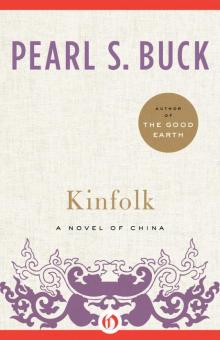 Kinfolk
Kinfolk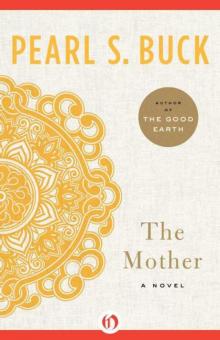 The Mother
The Mother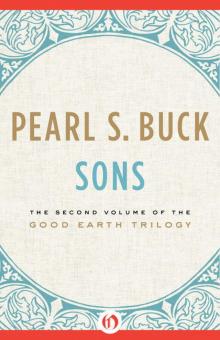 Sons
Sons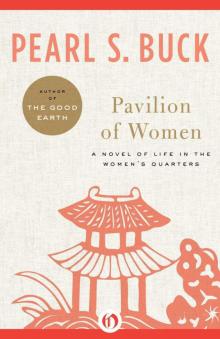 Pavilion of Women
Pavilion of Women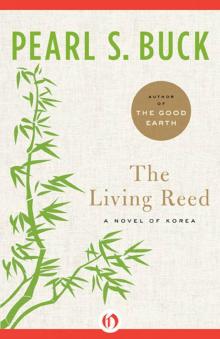 The Living Reed: A Novel of Korea
The Living Reed: A Novel of Korea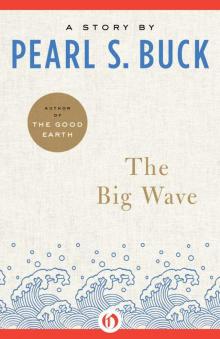 The Big Wave: A Novel
The Big Wave: A Novel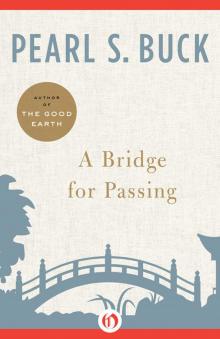 Bridge for Passing
Bridge for Passing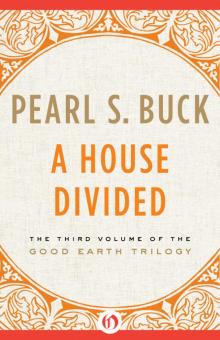 A House Divided
A House Divided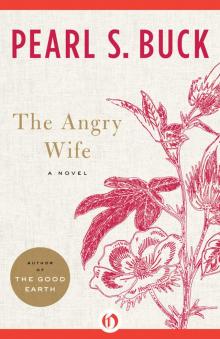 Angry Wife
Angry Wife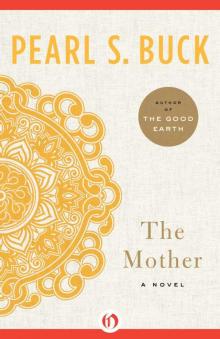 The Mother: A Novel
The Mother: A Novel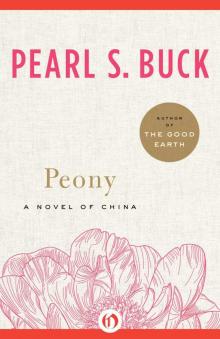 Peony: A Novel of China
Peony: A Novel of China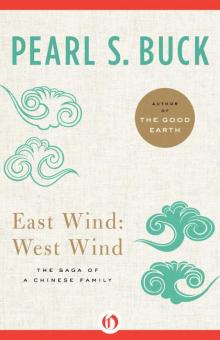 East Wind: West Wind
East Wind: West Wind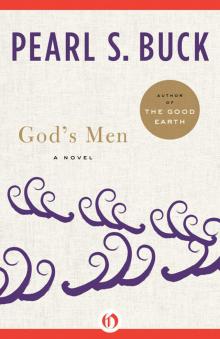 Gods Men
Gods Men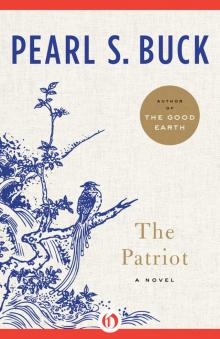 Patriot
Patriot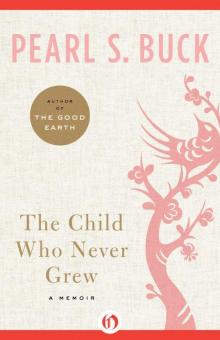 The Child Who Never Grew (nonfiction)
The Child Who Never Grew (nonfiction)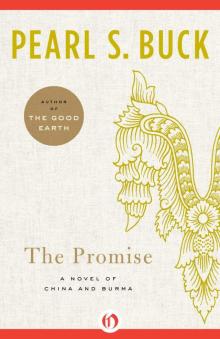 The Promise: A Novel of China and Burma (Oriental Novels of Pearl S. Buck)
The Promise: A Novel of China and Burma (Oriental Novels of Pearl S. Buck)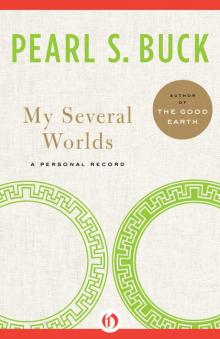 My Several Worlds
My Several Worlds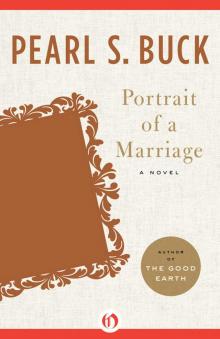 Portrait of a Marriage
Portrait of a Marriage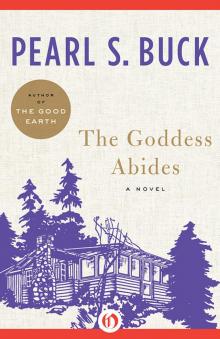 The Goddess Abides: A Novel
The Goddess Abides: A Novel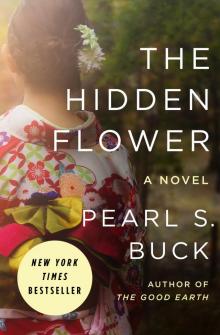 Hidden Flower
Hidden Flower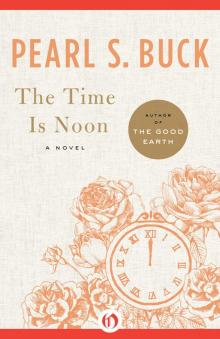 Time Is Noon
Time Is Noon